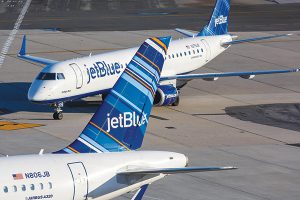Bargain-basement airfares sell themselves to no-frills customers on the hunt for a good deal. Bargain takeover deals? Not so much.
JetBlue Airways Corp announced it was going hostile in its effort to acquire Spirit Airlines Inc and thwart the ultra-low-cost carrier’s existing deal to be acquired by the parent company of Frontier Airlines.
JetBlue is offering $30 a share in cash, or $7 billion including the assumption of debt, directly to Spirit investors in a tender offer and is launching a proxy fight aimed at getting those holders to vote against the competing and much lower stock-and-cash proposal from Frontier. JetBlue’s tender offer is a modest discount to the $33 a share it had offered Spirit holders initially, although the airline says it’s willing to return to that price pending due diligence that Spirit’s board has thus far prevented it from conducting. Either offer is a substantial premium to Frontier’s proposal, which was valued at less than $19 a share after the stock of the acquirer slumped amid a broader market selloff.
This isn’t necessarily a situation where the highest offer will win. Spirit had rejected JetBlue’s offer largely because of concerns about its ability to win regulatory approval. This is a legitimate question, particularly because JetBlue is also attempting to defeat a lawsuit from the Department of Justice over its marketing alliance with American Airlines Group Inc and thus far appears unwilling to prioritise a Spirit transaction over that deal.
But a combination with Frontier is no slam dunk from a regulatory perspective, either. The politics around further airline consolidation has only become trickier in light of ticket inflation; a report from the Bureau of Labor Statistics showed airfares jumped by the most on record in April as carriers worked to offset rising fuel and labor costs.
With neither offer a sure thing, the value gap between the two is far too wide to make sense. It’s weird that Spirit thus far has been either unwilling or unable to use JetBlue’s offer as leverage to press Frontier for a higher price.
Unlike JetBlue, Frontier also hasn’t made any explicit commitments on
divestitures should regulators require them, nor has the airline agreed to compensate Spirit if it fails to win antitrust approval. JetBlue is offering a $200 million reverse breakup fee. As I wrote earlier this month, the decision to quickly and summarily rebuff JetBlue without getting anything in return from Frontier is something that Spirit’s board will have to better explain.
Right now, it’s far from clear why shareholders would agree that a significantly lower offer that carries regulatory risks of its own is obviously a superior proposal. JetBlue’s tender offer and proxy fight are merely forcing the issue.
At a minimum, it seems unlikely that Frontier and Spirit will be able to sell shareholders on the value of their merger at the original price. Frontier will need to raise its bid by some measure if it wants to win this fight. And it will be a fight: with workers and new planes difficult to come by, acquiring Spirit offers one of the more straightforward paths for JetBlue to grow after labour and operational challenges forced it to curtail its 2022 capacity goals.
Spirit remains one of the last theoretically plausible takeover opportunities in a highly consolidated airline industry. Deals like that don’t happen on the cheap.
—Bloomberg
Brooke Sutherland is a Bloomberg Opinion columnist covering deals and industrial companies. A former M&A reporter for Bloomberg News, she writes the Industrial Strength newsletter
 The Gulf Time Newspaper One of the finest business newspapers in the UAE brought to you by our professional writers and editors.
The Gulf Time Newspaper One of the finest business newspapers in the UAE brought to you by our professional writers and editors.

